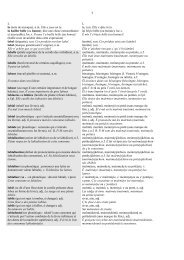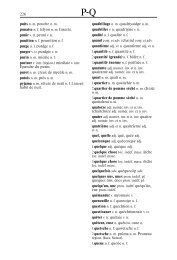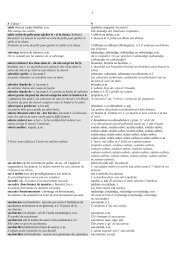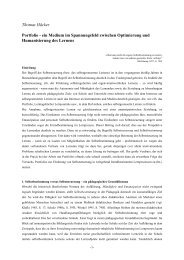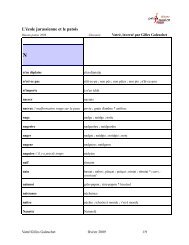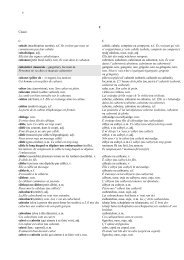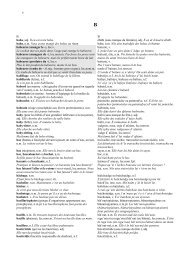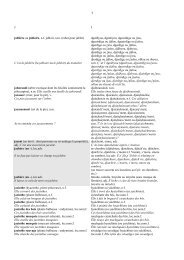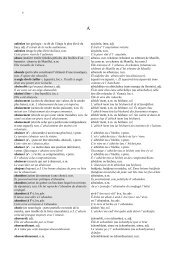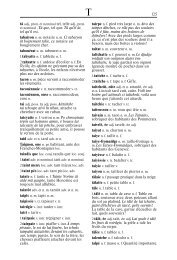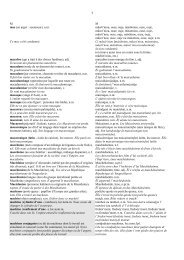R Classé ! R ra (onomatopée : coup de baguette ... - Image du Jura
R Classé ! R ra (onomatopée : coup de baguette ... - Image du Jura
R Classé ! R ra (onomatopée : coup de baguette ... - Image du Jura
Create successful ePaper yourself
Turn your PDF publications into a flip-book with our unique Google optimized e-Paper software.
amener (la -), loc.v.<br />
A sa place, je ne la <strong>ra</strong>mène<strong>ra</strong>is pas.<br />
<strong>ra</strong>me (petite -), loc.nom.f. Elle donne <strong>de</strong>s <strong>coup</strong>s <strong>de</strong><br />
petite <strong>ra</strong>me.<br />
<strong>ra</strong>mification (chacune <strong>de</strong>s b<strong>ra</strong>nches à une -),<br />
loc.nom.f. Il faut <strong>coup</strong>er une <strong>de</strong>s b<strong>ra</strong>nches <strong>de</strong> la<br />
<strong>ra</strong>mification.<br />
<strong>ra</strong>mollissement, n.m.<br />
Je crois bien qu’il a un <strong>ra</strong>mollissement <strong>du</strong> cerveau.<br />
<strong>ra</strong>mpante (potentille - ; plante appelée aussi<br />
quintefeuille), loc.nom.f. De la potentille <strong>ra</strong>mpante<br />
pousse dans la vigne.<br />
<strong>ra</strong>mpeau (faire -; gagner le même nombre <strong>de</strong> parties<br />
au jeu), loc.v. Ils ont fait <strong>ra</strong>mpeau au jeu <strong>de</strong> quilles.<br />
<strong>ra</strong>mpe (petite -), loc.nom.f.<br />
Nous escala<strong>de</strong>rons cette petite <strong>ra</strong>mpe.<br />
mannaie (moénaie ou moinnaie) l’ meûté (meuté, moére ou<br />
more), loc.v. En sai piaice, i n’ mannrôs (moénrôs ou moinnrôs)<br />
p’ le meûté (meuté, moére ou more).<br />
pâlatte, palatte, <strong>ra</strong>îmatte ou <strong>ra</strong>imatte, n.f. Èlle bèye <strong>de</strong>s côps<br />
d’ pâlatte (palatte, <strong>ra</strong>îmatte ou <strong>ra</strong>imatte).<br />
<strong>ra</strong>îmèe, <strong>ra</strong>imèe, <strong>ra</strong>îmie, <strong>ra</strong>imie, <strong>ra</strong>îmure, <strong>ra</strong>imure, tieuchie ou<br />
tyeuchie, n.f. È fât copaie ènne <strong>ra</strong>îmèe (<strong>ra</strong>imèe, <strong>ra</strong>îmie, <strong>ra</strong>imie,<br />
<strong>ra</strong>îmure, <strong>ra</strong>imure, tieuchie ou tyeuchie).<br />
<strong>ra</strong>imoéhl’ment, <strong>ra</strong>imôhléch’ment, <strong>ra</strong>imohléch’ment,<br />
<strong>ra</strong>imôléch’ment, <strong>ra</strong>imoléch’ment, <strong>ra</strong>intréch’ment,<br />
<strong>ra</strong>itâréch’ment, <strong>ra</strong>itaréch’ment, reintréch’mnt ou renmoéhl’ment,<br />
n.m. I c<strong>ra</strong>is bïn qu’ èl é ïn <strong>ra</strong>imoéhléch’ment (<strong>ra</strong>imôhléch’ment,<br />
<strong>ra</strong>imohléch’ment, <strong>ra</strong>imôléch’ment, <strong>ra</strong>imoléch’ment,<br />
<strong>ra</strong>intréch’ment, <strong>ra</strong>itâréch’ment, <strong>ra</strong>itaréch’ment, reintréch’mnt<br />
ou renmoéhl’ment) di cervé.<br />
(on trouve aussi tous ces noms sous la forme : <strong>ra</strong>imoéhlment,<br />
etc.)<br />
cïntçhefeuye, quïntefeuye, tçhïntefeuye ou tyïntefeuye, n.f.<br />
D’ lai cïntçhefeuye (quïntefeuye, tçhïntefeuye ou tyïntefeuye)<br />
bousse dains lai vaingne.<br />
faire <strong>ra</strong>ipé, loc.v.<br />
Èls aint fait <strong>ra</strong>ipé és gréyes.<br />
grétchatte, grétçhatte, greutchatte, greutçhatte, <strong>ra</strong>impatte ou<br />
sivatte, n.f. Nôs pésse<strong>ra</strong>ins poi ç’te grétchatte (grétçhatte,<br />
greutchatte, greutçhatte, <strong>ra</strong>impatte ou sivatte).<br />
<strong>ra</strong>incâd, n.m.<br />
<strong>ra</strong>ncard ou rencard (renseignement confi<strong>de</strong>ntiel),<br />
n.m. Tu ne parle<strong>ra</strong>s pas <strong>de</strong> ce <strong>ra</strong>ncard (ou rencard). Te n’ djâs’rés p’ d’ ci <strong>ra</strong>incâd.<br />
<strong>ra</strong>ncard ou rencard (au sens populaire : ren<strong>de</strong>z- <strong>ra</strong>incâd, n.m.<br />
vous), n.m. Vous ne m’avez pas encore proposé un<br />
<strong>ra</strong>ncard (ou rencard). (Queneau)<br />
Vôs n’ m’ èz p’ encoé prepôjè ïn <strong>ra</strong>incâd.<br />
<strong>ra</strong>ncar<strong>de</strong>r ou rencar<strong>de</strong>r (au sens populaire : rensei- <strong>ra</strong>incâdaie, v.<br />
gner secrètement, indiquer un <strong>coup</strong> à faire), v. Il m’a<br />
bien semblé qu’il <strong>ra</strong>ncardait (ou rencardait).<br />
È m’ é bïn sannè qu’ è <strong>ra</strong>incâdait.<br />
<strong>ra</strong>ncar<strong>de</strong>r ou rencar<strong>de</strong>r (au sens populaire : donner <strong>ra</strong>incâdaie, v.<br />
un ren<strong>de</strong>z-vous), v. Il <strong>ra</strong>ncar<strong>de</strong> (ou rencar<strong>de</strong>) ses<br />
aimis.<br />
È <strong>ra</strong>incâ<strong>de</strong> ses aimis.<br />
<strong>ra</strong>ncar<strong>de</strong>r ou rencar<strong>de</strong>r (se - ; au sens populaire : se s’ <strong>ra</strong>incâdaie, v.pron.<br />
renseigner secrètement), v.pron. Je pense qu’il s’est<br />
<strong>ra</strong>ncardé (ou rencardé).<br />
I m’ muse qu’ è s’ ât <strong>ra</strong>incâdè.<br />
<strong>ra</strong>ncar<strong>de</strong>r ou rencar<strong>de</strong>r (se - ; au sens populaire : se s’ <strong>ra</strong>incâdaie, v.pron.<br />
donner un ren<strong>de</strong>z-vous), v.pron. Ils trouveront déjà<br />
bien une occasion <strong>de</strong> se <strong>ra</strong>ncar<strong>de</strong>r (ou rencar<strong>de</strong>r).<br />
Ès v’lant dj’ bïn trovaie ènne câse d’ se <strong>ra</strong>incâdaie.<br />
<strong>ra</strong>ncart (rebut), n.f.<br />
récât, n.m.<br />
Il met un tas <strong>de</strong> choses au <strong>ra</strong>ncart.<br />
È bote brâment d’ tchôses â récât.<br />
<strong>ra</strong>ncart (au sens figuré : abandon), n.f.<br />
récât, n.m.<br />
La mise au <strong>ra</strong>ncart <strong>de</strong> son projet est pour bientôt. Lai mije â récât d’ son prodjèt ât po bïntôt.<br />
<strong>ra</strong>nçon (prix que l’on exige pour délivrer une <strong>ra</strong>inchon ou <strong>ra</strong>inçon, n.f.<br />
personne captive), n.f. Il a payé une <strong>ra</strong>nçon.<br />
Èl é paiyie ènne <strong>ra</strong>inchon (ou <strong>ra</strong>inçon).<br />
<strong>ra</strong>nçon (inconvénient que comporte un avantage, un <strong>ra</strong>inchon ou <strong>ra</strong>inçon, n.f.<br />
plaisir), n.f. Il connaît la <strong>ra</strong>nçon <strong>de</strong> la célébrité. È coégnât lai <strong>ra</strong>inchon (ou <strong>ra</strong>inçon) d’ lai céyébritè.<br />
<strong>ra</strong>nçonnement (le fait <strong>de</strong> <strong>ra</strong>nçonner), n.m.<br />
<strong>ra</strong>inchonn’ment ou <strong>ra</strong>inçonn’ment, n.f.<br />
Elle a été victime d’un <strong>ra</strong>nçonnement.<br />
Èlle ât aivu vitçhtïnme d’ ïn <strong>ra</strong>inchonn’ment (ou <strong>ra</strong>inçonn’ment).<br />
<strong>ra</strong>nçonner (proposer <strong>de</strong> relâcher contre une <strong>ra</strong>nçon), <strong>ra</strong>inchonnaie ou <strong>ra</strong>inçonnaie, v.<br />
v. Le corsaire a <strong>ra</strong>nçonné le bateau.<br />
L’ lâdre é <strong>ra</strong>inchonnè (ou <strong>ra</strong>inçonnè) lai nèe.<br />
<strong>ra</strong>nçonner (exiger une contribution qui n’est pas <strong>du</strong>e), <strong>ra</strong>inchonnaie ou <strong>ra</strong>inçonnaie, v.<br />
v. Ils ont <strong>ra</strong>nçonné les voyageurs.<br />
Èls aint <strong>ra</strong>inchonnè (ou <strong>ra</strong>inçonnè) les viaidgeous.<br />
<strong>ra</strong>nçonner (exiger plus qu’il n’est dû), v.<br />
<strong>ra</strong>inchonnaie ou <strong>ra</strong>inçonnaie, v.<br />
L’état <strong>ra</strong>nçonne les contribuables.<br />
L’ état <strong>ra</strong>inchonne (ou <strong>ra</strong>inçonne) les cheûmis.<br />
<strong>ra</strong>nçonneur (personne qui <strong>ra</strong>nçonne), n.m.<br />
<strong>ra</strong>inchonnou, ouse, ouje ou <strong>ra</strong>inçonnou, ouse, ouje, n.m.<br />
Le <strong>ra</strong>nçonneur a été arrêté.<br />
L’ <strong>ra</strong>inchonnou (ou <strong>ra</strong>inçonnou) ât aivu râtè.<br />
17



